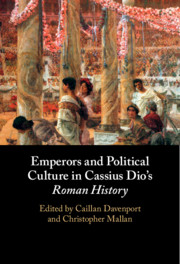Book contents
- Emperors and Political Culture in Cassius Dio’s Roman History
- Emperors and Political Culture in Cassius Dio’s Roman History
- Copyright page
- Contents
- Figures
- Contributors
- Preface
- Abbreviations
- Introduction Cassius Dio
- I Imperial and Political Narratives
- II Emperors and Biographies
- Chapter 5 Cassius Dio’s Funeral Speech for Augustus
- Chapter 6 ‘ … But He Possessed a Most Singular Nature’
- Chapter 7 An Emperor’s War on Greece
- Chapter 8 War and Peace
- III Political Groups and Political Culture
- IV Reception and Reflection
- Bibliography
- Index
Chapter 5 - Cassius Dio’s Funeral Speech for Augustus
Sources, Rhetoric, Messages
from II - Emperors and Biographies
Published online by Cambridge University Press: 23 July 2021
- Emperors and Political Culture in Cassius Dio’s Roman History
- Emperors and Political Culture in Cassius Dio’s Roman History
- Copyright page
- Contents
- Figures
- Contributors
- Preface
- Abbreviations
- Introduction Cassius Dio
- I Imperial and Political Narratives
- II Emperors and Biographies
- Chapter 5 Cassius Dio’s Funeral Speech for Augustus
- Chapter 6 ‘ … But He Possessed a Most Singular Nature’
- Chapter 7 An Emperor’s War on Greece
- Chapter 8 War and Peace
- III Political Groups and Political Culture
- IV Reception and Reflection
- Bibliography
- Index
Summary
The chapter analyses Tiberius’ funeral oration in honour of the deceased emperor Augustus, as composed and inserted by Cassius Dio at the end of his Augustan narrative (56.35-41). The chapter reveals that Dio devised this speech with a keen interest in exploring the perspective of the imperial domus and its relationship to his own assessment of Rome’s first emperor as presented in the main narrative in Books 45–56. By examining the content, structure and rhetoric of the oration and comparing it with the Res Gestae Divi Augusti, the chapter argues that Dio may have drawn on this important epigraphic document as a key source for the composition of the speech. The chapter furthermore examines the authenticity of Dio’s reconstruction of the imperial perspective and assesses to what extent he left his own imprint on the speech to make it relevant for his third-century audience. In addition, it investigates Dio’s motivation for composing the oration: it shows that the historian not only employed the speech to present the imperial perspective at a key moment of Roman history but also to discuss the principles of good imperial governance and imperial virtues. By inserting the oration at this particular point of his Roman History, Dio invites his readers to compare all the later emperors to the Augustan model.
- Type
- Chapter
- Information
- Emperors and Political Culture in Cassius Dio's Roman History , pp. 115 - 132Publisher: Cambridge University PressPrint publication year: 2021



